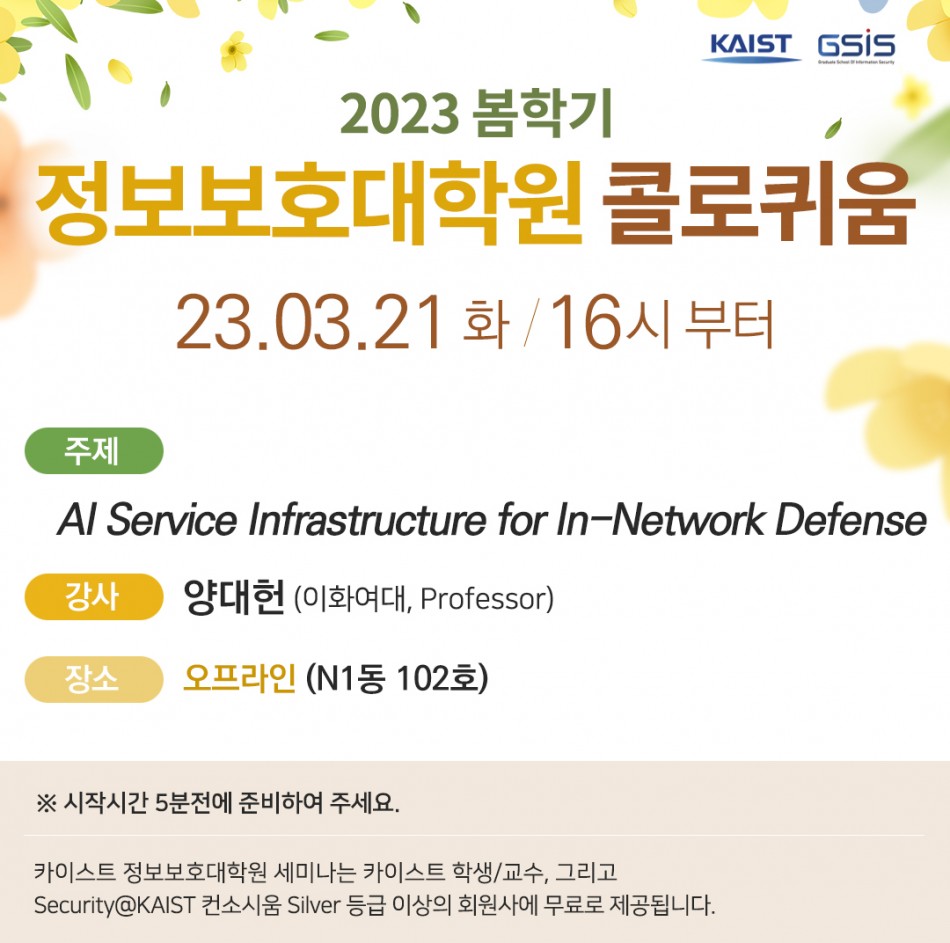정보보호대학원에서는 3월 21일 오후 4시에 아래와 같이 콜로퀴움을 개최하고자 합니다. 많은 참석 부탁드립니다.
o 일 시: 23. 03. 21(화) 16:00~
o 주 제: AI Service Infrastructure for In-Network Defense
o 강 사: 양대헌 (이화여대, Professor)
o 장 소: 오프라인(N1동 102호)
※ 세미나 시작시간 5분전에 준비하여 주세요.
ㅡㅡㅡ
♣ Title: AI Service Infrastructure for In-Network Defense
♣ Abstract
In this talk, we are going to present a framework as a service infrastructure of AI for In-Network Defense. Focusing on router architecture especially on data plane feasibility, what we can do for AI-powered routers is shown in terms of real-time feature extraction using data sketch and real-time ACL management.
Two data plane-feasible data sketches are introduced, one for cardinality estimation (IEEE/IFIP DSN 2022) and the other for flow size estimation (ISOC NDSS 2023). For ACL management in a programmable router, a scalable and dynamic ACL system is presented (ACM CCS 2022). These technologies are the foundation of AI-powered In-Network Defense.
♣ Bio
DaeHun Nyang (양대헌) received B.Eng. degree with double major in electronic engineering and in computer science from Korea Advanced Institute of Science and Technology (KAIST), M.S. and Ph.D. degrees in computer science from Yonsei University, Korea in 1994, 1996, and 2000 respectively. He had been a senior researcher at Electronics and Telecommunications Research Institute, Korea (ETRI), from 2000 to 2003. From 2003 to 2020, he had been a professor at Computer Science and Engineering Department of Inha University, Korea. Since 2020, he has been a professor at Cyber Security Department of ELTech Engineering College of Ewha Womans University. He has been the founding director of the Information Security Research Laboratory since 2003. He is an executive director of Korean Institute of Information Security and Cryptology. He also serves KIISC Journal as the EiC (Editor in Chief) and ETRI Journal as a section editor (Information security section). He’s a member of IEEE, ACM, and KIISC.
Dr. Nyang’s research interests include all algorithmic aspects of AI security, AI attack, network security, privacy, usable security, authentication, and public key cryptography. His recent interest lies also in network measurement, load balancing algorithm, counting algorithm, fast hash table, key value store for in-memory DB, random sampling theory, and INS (In-Network Security) powered by programmable routers.







